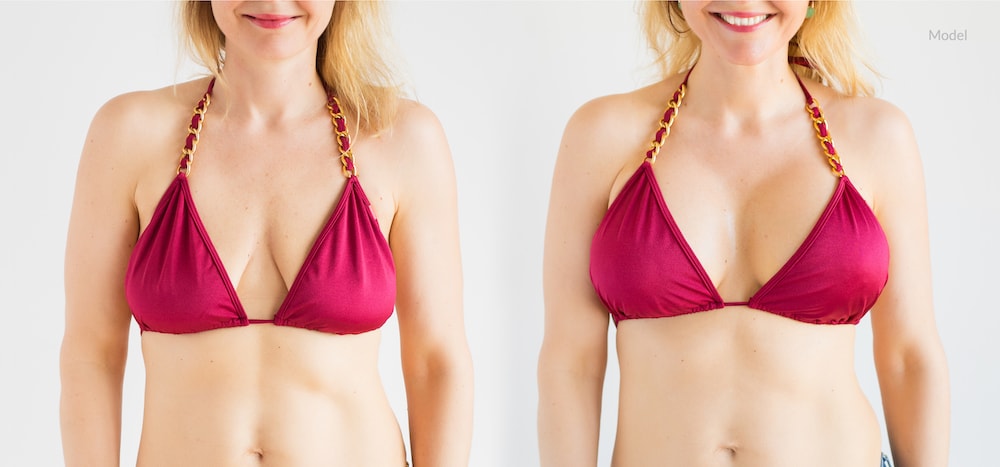Home|Blog | Are Breast Implants Better Than Fat Grafting for Breast Augmentation?
Are Breast Implants Better Than Fat Grafting for Breast Augmentation?
3 Minute Read:
For many decades, breast implants were essentially the only way to achieve larger breasts for cosmetic reasons. These days, a very small number of women are opting for alternative treatments like fat grafting. Fat grafting can be a very useful technique, particularly as an adjunct or a supporting role for a variety of issues in the realm of plastic surgery. However, with regards to the method to obtain a breast augmentation with a substantial size increase, fat grafting is not close to being prime time yet.

Breast implants still rule supreme—particularly silicone ones.
What Are the Advantages of Fat Grafting?
There are advantages of fat grafting that make it a potentially appealing procedure for many women. For starters, the material used comes from the patient’s own body. This means that a fat graft takes unwanted fat from another location, which works well for women who want their breasts enlarged and fat deposits removed elsewhere.
It also doesn’t necessarily have an expiration date or a need to be replaced later on, sort of. One also doesn’t have to deal with issues such as capsular contracture. The results can be soft and natural feeling, somewhat like native breast tissue.
What Are the Disadvantages of Fat Grafting?
Despite the advantages, fat grafting has numerous and significant downsides. For starters, it is absolutely necessary that the patient has excess fat elsewhere. If they don’t have unwanted fat deposits or only a limited amount of potential donor fat, then the procedure either can’t be performed, or the augmentation will be severely limited.
Another issue is that fat grafting is less precise. You can’t guarantee the shape of transferred fat the same way you can guarantee a silicone implant. Also, the body will naturally absorb some of the fat. To compensate for this, most plastic surgeons inject more fat than necessary into the breast tissue and hope that enough remains after the initial absorption. Since it is impossible to predict how much fat will be absorbed, your breasts may end up far larger or smaller than you desire.
Another issue is that it is better if the breast skin is “stretched” out for a period of time before the grafting to increase the success rate of the fat take and extent of the enlargement. This process can be quite problematic, uncomfortable, expensive, and time-consuming.
Other downside issues include that usually more than one procedure would be needed to obtain more than a cup size increase in volume, the cost of each procedure can be very prohibitive for many, each procedure means additional downtime from work, school and/or other activities and substantial weight gains or losses can markedly affect breast size.
What Are the Advantages of Breast Implants?
Breast implants, especially silicone implants, are far more effective than fat injections in almost every respect. Breast implants implanted via breast augmentation surgery are highly customizable, allowing control over the new breasts’ size and shape. There is no guessing what size the implant will be in six months and no concerns about the implant changing shape after the first few weeks. The procedure is not dependent on extracting material from an unrelated part of the body. Instead, breast implants are chosen from a vast selection of implants with a multitude of useful variables, and not expected to change with time.
There is better longevity for breast implants as well. While fat grafting is technically permanent, the effects can fade with age and decreased structural support. On the other hand, breast implants can last up to or exceeding 30 years, if not longer.
If you are seeking to have a breast augmentation, the traditional method with breast implants is still the best way to go.
Want to Learn More?
If you would like to learn more about breast augmentation or are interested in scheduling a consultation, please contact Dr. Turkeltaub at (480) 451-3000 or fill out our online contact form.
